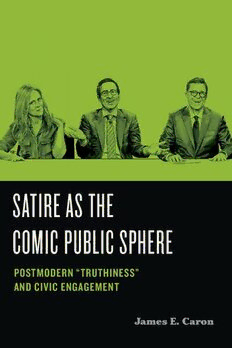
Satire as the Comic Public Sphere: Postmodern Truthiness and Civic Engagement PDF
Preview Satire as the Comic Public Sphere: Postmodern Truthiness and Civic Engagement
SATIRE AS THE COMIC PUBLIC SPHERE POSTMODERN “TRUTHINESS” AND CIVIC ENGAGEMENT James E. Caron SATIRE AS THE COMIC PUBLIC SPHERE Humor in America Edited by Judith Yaross Lee, Ohio University Tracy Wuster, The University of Texas at Austin Advisory Board Darryl Dickson-Carr, Southern Methodist University Joanne Gilbert, Alma College Rebecca Krefting, Skidmore College Bruce Michelson, University of Illinois at Urbana-Champaign Nicholas Sammond, University of Toronto The Humor in America series considers humor as an expressive mode reflecting key concerns of people in specific times and places. With interdisciplinary research, historical and transnational approaches, and comparative scholarship that carefully examines contexts such as race, gender, class, sexuality, region, and media environments, books in the series explore how comic expression both responds to and shapes American culture. SATIRE AS THE COMIC PUBLIC SPHERE Postmodern “Truthiness” and Civic Engagement James E. Caron The Pennsylvania State University Press University Park, Pennsylvania Library of Congress Cataloging-in-Publication Data Names: Caron, James Edward, 1952– author. Title: Satire as the comic public sphere : postmodern “truthiness” and civic engagement / James E. Caron. Other titles: Humor in America. Description: University Park, Pennsylvania : The Pennsylvania State University Press, [2021] | Series: Humor in America | Includes bibliographical references and index. Summary: “Examines the work of satirists through the lenses of humor studies, cultural theory, and rhetorical and social philosophy, arriving at a new definition of the comic art form”—Provided by publisher. Identifiers: LCCN 2021011109 | ISBN 9780271089867 (hardback) Subjects: LCSH: Political satire, American—History and criticism. | Public sphere—United States. | Postmodernism—United States. Classification: LCC PN6149.P64 C37 2021 | DDC 320.97302/07—dc23 LC record available at https://lccn.loc.gov/2021011109 Copyright © 2021 James E. Caron All rights reserved Printed in the United States of America Published by The Pennsylvania State University Press, University Park, PA 16802–1003 The Pennsylvania State University Press is a member of the Association of University Presses. It is the policy of The Pennsylvania State University Press to use acid-free paper. Publications on uncoated stock satisfy the minimum requirements of American National Standard for Information Sciences—Permanence of Paper for Printed Library Material, ansi z39.48–1992. slapstick laughs at the imperative of the bladder and demands lunch before social justice snark mocks the public sphere and nurtures partisan truthiness satire laughs at public sphere vice and folly and enables silly citizenship —JEC Contents Acknowledgments ix Introduction 1 Part 1: Satire and the Public Sphere 1. Defining Satire 19 2. The Public Sphere 36 3. Truthiness Satire and the Comic Public Sphere 52 Part 2: Doing Things with Satiric Words 4. Satire and Speech Act Theory 85 5. Satire as Speech Act, Part One 89 6. Satire as Speech Act, Part Two 117 7. The Limits of Satiric Ridicule 155 8. Satiric Intent and Audience Uptake 189 9. Find the Punchline 208 Notes 231 Index 263 Acknowledgments I begin my rounds of thanks with the students in a 2017 Senior Honors Seminar on postmodern satire. Discussions over the semester with the extraordinary group that made up the class helped me to think through a number of issues presented in this book. I want next to thank Ryan Peterson for his invaluable editorial sugges- tions and all the Penn State University Press staff for their support in the process of bringing the book to publication. Thanks also to the editors of the series Humor in America, Judith Yaross Lee and Tracy Wuster, for seeing the potential in the book. They have been my steadfast colleagues over the years in the collective investigation by scholars of cultural arti- facts that make people laugh, an enterprise usually designated as “humor studies.” A special thanks goes to Judith Lee, with whom I have shared many conversations over the years about humor in America as well as about all manner of comic cultural artifacts and comic laughter. Her invitation to speak at Ohio University on my idea about speech acts in the comic public sphere provided the genesis of the project, and when we spoke about elab- orating the talk into a book project for the Humor in America series, she supplied needed encouragement and also sound advice about how to proceed, all in her usual generous fashion. My wife Michelle (as always) deserves thanks as my best and most faithful interlocutor as I ramble through ideas and try out formulations. Portions of the book are excerpted from the following: “Satire and the Problem of Comic Laughter,” Comedy Studies 11, no. 2 (2020): 171–82, DOI: 10 .1080 /2040610X .2020 .1729485; “The Quantum Paradox of Truthi- ness: Satire, Activism, and the Postmodern Condition,” Studies in American Humor, ser. 4, vol. 2, no. 2 (2016): 153–81; and “Comic Belles Lettres and a Literary History of the American Comic Tradition,” Studies in American Humor, ser. 3, no. 29 (2014): 13–34.
